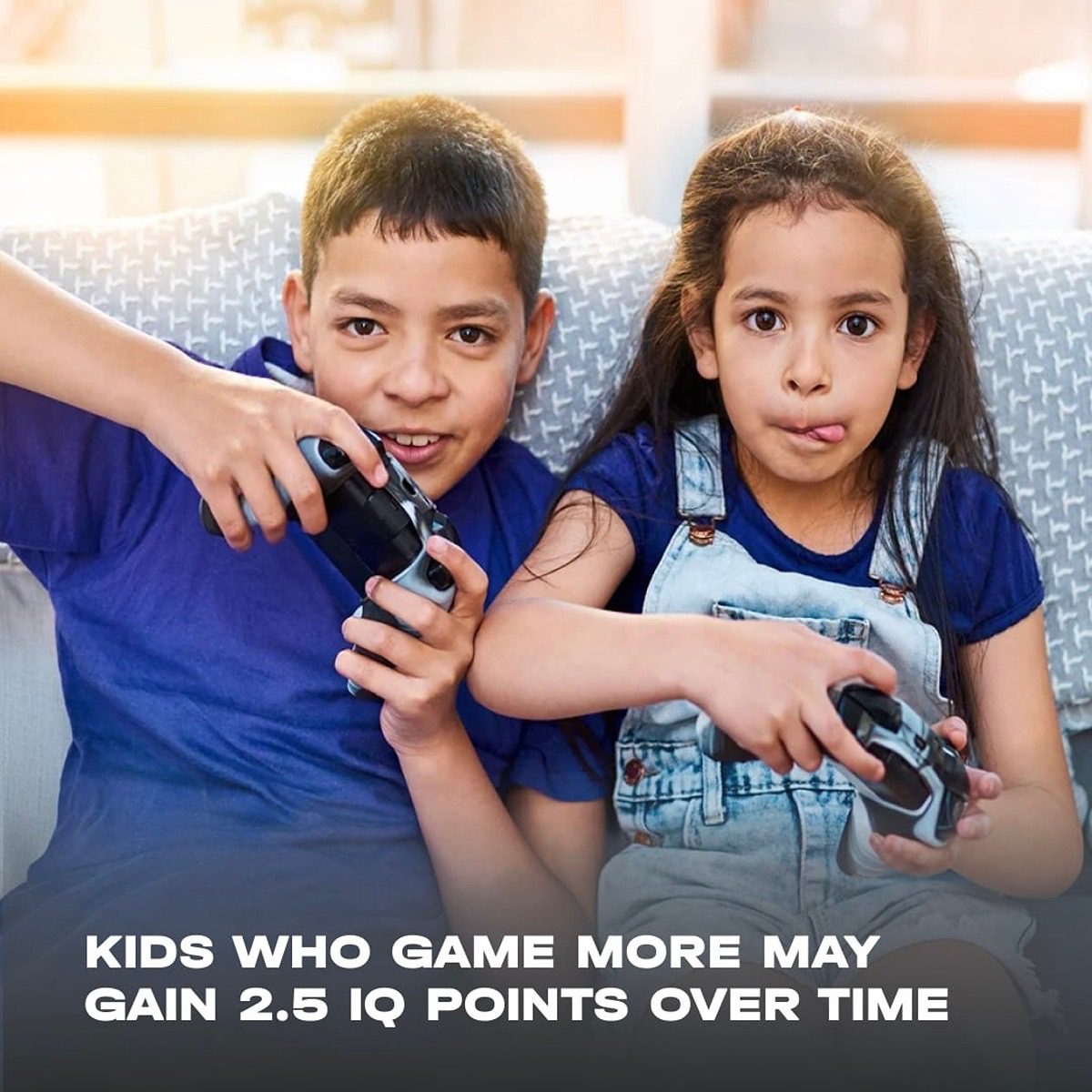Growing up, I always heard, “Video games will rot your kid’s brain!” But as a parent, I found myself curious: could gaming actually help my child learn? A new long-term study has an eye-opening answer. Researchers followed nearly 10,000 U.S. kids (ages 9–10) over two years and discovered that those who played more video games than average saw a 2.5-point IQ gain on average. This benefit held even after accounting for each child’s genetics and family background. In contrast, extra time watching TV or scrolling social media had no similar IQ boost. It turns out intelligence isn’t fixed – the brain can grow, and interactive play like gaming may nudge it upward.

- Key Study Findings: The study (by Karolinska Inst. and others) tracked 9–10 year olds’ screen habits. Kids who played above-average amounts of video games gained roughly 2.5 IQ points over two years. Importantly, researchers controlled for genetic and socioeconomic factors (things like family income and inherited ability) to isolate the effect. Meanwhile, children who spent extra time on TV or social media showed no IQ gain. The intelligence tests measured skills in areas like reading, memory, problem-solving and flexibility. In other words, kids who gamed more didn’t just get better at games – they improved on real-world cognitive tasks.
Why Video Games Can Help Learning
At first I was skeptical, but thinking about it makes sense. Modern video games can be complex puzzles and adventures wrapped in fun. For example, many games require strategic planning (think Civilization or Fortnite battles) and quick problem-solving. They often weave stories and logic puzzles into gameplay. My own child loves building in Minecraft, which actually teaches geometry and creativity. These activities exercise the brain. As one expert noted, video games involve self-directed learning: kids set goals, adjust strategies, and get instant feedback. This “active learning” can boost attention and memory, much like brain-training exercises. In fact, the study authors observed that gaming’s impact on intelligence is consistent with other research showing kids can train their brains over time.
Balancing Screen Time with a Healthy Lifestyle
Of course, no one is saying our kids should play video games all day. Moderation is key. Health experts still recommend limits. For instance, the American Academy of Pediatrics suggests older children have no more than 1–2 hours of total screen time per day. The Child Mind Institute even advises about 1 hour on school days and 2 hours on weekends for kids over 6. Too much gaming can lead to sedentary habits, sleep loss or mood issues. Studies have linked excessive gaming to problems like obesity, anxiety, or disturbed sleep. Parents are also warned to watch for “gaming addiction” signs – things like withdrawal, irritability when not playing, or losing interest in other hobbies.
In our family, we keep gaming part of a balanced routine. My child might play an educational puzzle game after homework, then take a break for outdoor play and dinner. We stick to the AAP’s 1-2 hour guideline and make sure to include plenty of exercise and reading time. We’ve even started a weekly family game night (board games or co-op video games) which everyone enjoys – it’s great for teamwork and laughs.
Tips for Parents: Making Gaming Work for Your Kid
- Choose the right games: Look for age-appropriate titles that encourage thinking. Puzzle, strategy and adventure games often include math, history or logic problems. Games with storytelling can boost reading and imagination. (My child’s favorites are things like BrainPOP, Osmo coding games, and cooperative games that we play together.)
- Set time limits: Follow pediatric guidelines – roughly 1–2 hours per day for older kids (and less for younger ones). Use timers or parental controls if needed. Make sure gaming doesn’t crowd out homework, chores, sleep or physical activity.
- Stay involved: Play some games with your kids! This helps you monitor content and also turns gaming into family time. Talking about what they’re learning in the game reinforces those lessons. For example, when my kid races a car in a game, I’ll ask how speed and distance are related, turning it into a mini science chat.
- Watch for warning signs: Keep an eye on mood and behavior. If your child becomes unusually agitated or anxious when not gaming, or gaming interferes with school and sleep, it might be time to pull back. Encourage a variety of activities – sports, arts, outdoor play – alongside gaming.
Looking Ahead: The Future of Learning and Gaming
This research is just a first step. The same group that did the IQ study is continuing to follow these kids into their teens and beyond. Future findings will help us understand how gaming interacts with development over time. For instance, researchers will look at other factors like exercise, sleep or brain scans to see the full picture.
Meanwhile, game technology keeps evolving. We’re already seeing more “edutainment” – games designed for learning subjects, plus virtual reality (VR) experiences that let kids explore science or history hands-on. Some experts even talk about AI-powered games that adapt to each child’s learning level, essentially giving personalized tutoring through play. These developments could make gaming an even stronger educational tool.
As a parent, this new study has made me rethink old assumptions. I still limit screen time, but I’m less fearful of video games. Instead, I view gaming as one piece of my child’s learning puzzle. By choosing enriching games and keeping a healthy balance, I’m hopeful that my child will reap the benefits – maybe even an extra boost in smarts – while growing up.
